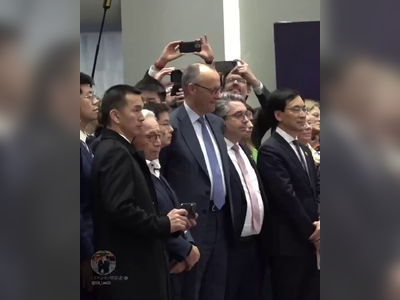
Xiaohongshu: China's Trendsetting Social Media App Takes Roots in the U.S.
As TikTok faces restrictions in America, Xiaohongshu emerges as a new haven for dislocated creators and consumers.
In an ironic twist of fate, Xiaohongshu, a Chinese social media app whose name means 'Little Red Book'—a nod to the revolutionary text by Chairman Mao Zedong—has become a beacon of consumerist culture.
With a burgeoning user base of 300 million, the app is populated by a plethora of videos from young Chinese urging their peers to explore, indulge, and splurge, creating a liberal oasis amid China's typically conservative and censored digital landscape.
The app’s premise is decidedly different from Mao's austere doctrines, instead presenting a vibrant tapestry of lifestyle content.
Shuang, a 29-year-old resident of Shanghai, exemplifies the typical Xiaohongshu user with her primary interest in dining recommendations around the city.
As she travels domestically and internationally, the app becomes an invaluable guide filled with insights from seasoned Chinese travelers.
Beyond travel advice, Shuang uses Xiaohongshu as a digital marketplace, leveraging its vast e-commerce and live-streaming features to purchase clothing, akin to a modern teletienda where popular streamers engage audiences with live showcases of products.
Xiaohongshu's rise among China's urban Millennials and Gen Z contrasts with traditional social platforms, capturing the attention of Western analysts who liken it to a blend of Instagram, TikTok, Pinterest, and TripAdvisor.
This comparison underscores its multifaceted appeal and its divergence from Chinese government narratives.
The app has recently captured global headlines after becoming the top-ranked social media app on Apple's U.S. App Store.
This surge is seen as a response from users disenchanted with the looming restrictions against TikTok in America.
A bipartisan law scheduled to take effect on January 19 threatens to ban TikTok from U.S. app stores unless the Supreme Court intervenes following hearings on TikTok’s legal challenge.
This digital migration was highlighted by stories of influencers like Nuha, boasting over 1.5 million TikTok followers, who urged her audience to join her on Xiaohongshu.
In her inaugural video on the platform, Nuha expressed her mixed emotions about this transition: "Hello everyone, I’m a TikTok refugee.
I’m nervous but excited about venturing into this app alongside all of you.
It’s sad to think TikTok might really disappear, but if this is where we will gather, welcome to my profile," she shared on Xiaohongshu.
In subsequent posts, Nuha has taken to educating her followers on setting up accounts on the China-based platform, highlighting Xiaohongshu's origins in 2013 Shanghai by founders Charlwin Mao and Miranda Qu, the current CEO.
Originally conceived as a space for Chinese netizens to share snippets of their lives, Xiaohongshu has grown thanks to investments from prominent Chinese tech companies Tencent and Alibaba.
The platform reports that 50% of its users are aged 15 to 28, and over 70% are women, marking a vibrant and youthful demographic.
As Xiaohongshu continues to evolve, it illustrates the paradox of modern China: a society influenced simultaneously by its revolutionary past and by an insatiable appetite for the freedoms offered by Western consumer culture.
With a burgeoning user base of 300 million, the app is populated by a plethora of videos from young Chinese urging their peers to explore, indulge, and splurge, creating a liberal oasis amid China's typically conservative and censored digital landscape.
The app’s premise is decidedly different from Mao's austere doctrines, instead presenting a vibrant tapestry of lifestyle content.
Shuang, a 29-year-old resident of Shanghai, exemplifies the typical Xiaohongshu user with her primary interest in dining recommendations around the city.
As she travels domestically and internationally, the app becomes an invaluable guide filled with insights from seasoned Chinese travelers.
Beyond travel advice, Shuang uses Xiaohongshu as a digital marketplace, leveraging its vast e-commerce and live-streaming features to purchase clothing, akin to a modern teletienda where popular streamers engage audiences with live showcases of products.
Xiaohongshu's rise among China's urban Millennials and Gen Z contrasts with traditional social platforms, capturing the attention of Western analysts who liken it to a blend of Instagram, TikTok, Pinterest, and TripAdvisor.
This comparison underscores its multifaceted appeal and its divergence from Chinese government narratives.
The app has recently captured global headlines after becoming the top-ranked social media app on Apple's U.S. App Store.
This surge is seen as a response from users disenchanted with the looming restrictions against TikTok in America.
A bipartisan law scheduled to take effect on January 19 threatens to ban TikTok from U.S. app stores unless the Supreme Court intervenes following hearings on TikTok’s legal challenge.
This digital migration was highlighted by stories of influencers like Nuha, boasting over 1.5 million TikTok followers, who urged her audience to join her on Xiaohongshu.
In her inaugural video on the platform, Nuha expressed her mixed emotions about this transition: "Hello everyone, I’m a TikTok refugee.
I’m nervous but excited about venturing into this app alongside all of you.
It’s sad to think TikTok might really disappear, but if this is where we will gather, welcome to my profile," she shared on Xiaohongshu.
In subsequent posts, Nuha has taken to educating her followers on setting up accounts on the China-based platform, highlighting Xiaohongshu's origins in 2013 Shanghai by founders Charlwin Mao and Miranda Qu, the current CEO.
Originally conceived as a space for Chinese netizens to share snippets of their lives, Xiaohongshu has grown thanks to investments from prominent Chinese tech companies Tencent and Alibaba.
The platform reports that 50% of its users are aged 15 to 28, and over 70% are women, marking a vibrant and youthful demographic.
As Xiaohongshu continues to evolve, it illustrates the paradox of modern China: a society influenced simultaneously by its revolutionary past and by an insatiable appetite for the freedoms offered by Western consumer culture.
Translation:
•
Translated by AI
AI Disclaimer: An advanced artificial intelligence (AI) system generated the content of this page on its own. This innovative technology conducts extensive research from a variety of reliable sources, performs rigorous fact-checking and verification, cleans up and balances biased or manipulated content, and presents a minimal factual summary that is just enough yet essential for you to function as an informed and educated citizen. Please keep in mind, however, that this system is an evolving technology, and as a result, the article may contain accidental inaccuracies or errors. We urge you to help us improve our site by reporting any inaccuracies you find using the "Contact Us" link at the bottom of this page. Your helpful feedback helps us improve our system and deliver more precise content. When you find an article of interest here, please look for the full and extensive coverage of this topic in traditional news sources, as they are written by professional journalists that we try to support, not replace. We appreciate your understanding and assistance.











